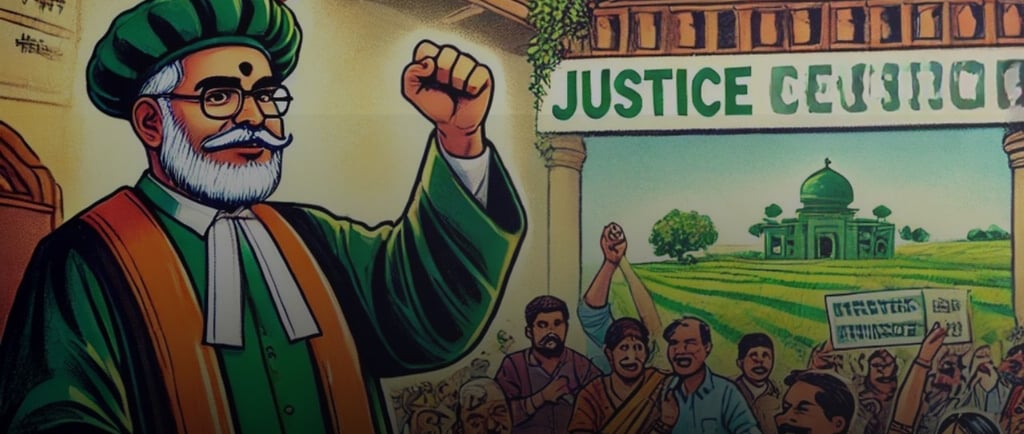High Court Sets Aside Board of Revenue’s Order, Upholds Petitioners’ Land Rights
Madhya Pradesh High Court at Jabalpur, presided over by Hon'ble Justice Vishal Dhagat, allowed a writ petition filed under Article 227 of the Constitution. The petition challenged the Board of Revenue's order dated December 16, 2013, which had declared a mutation in favor of the respondents, overturning the legal heirs' claim to the disputed land.
12/12/20242 min read


In a significant judgment dated December 9, 2024, the Madhya Pradesh High Court at Jabalpur, presided over by Hon'ble Justice Vishal Dhagat, allowed a writ petition filed under Article 227 of the Constitution. The petition challenged the Board of Revenue's order dated December 16, 2013, which had declared a mutation in favor of the respondents, overturning the legal heirs' claim to the disputed land.
Case Background:
The land in question, located in village Karodaha, Tehsil Sirmour, originally belonged to Mangal Chamar. In 1952, a sale deed was executed by Mangal Chamar transferring the land to Swami Dayal, the petitioners' ancestor. Following Mangal Chamar’s death, the revenue records reflected the names of his legal heirs—wife Smt. Durghatiya Bai and daughter Smt. Sathiniya. However, subsequent disputes arose over the validity and registration of the 1952 sale deed and the rightful possession of the land.
A registered sale deed was later executed in 1988 by Smt. Durghatiya Bai in favor of respondents Teerath, Jageshwar, and Gangadeen. Based on this transaction, the Board of Revenue set aside prior orders of the Tehsildar and Commissioner favoring the petitioners, arguing that the original 1952 deed was unregistered and the mutation application was filed after a 33-year delay.
Petitioners’ Argument:
The petitioners contended that the sale deed executed in 1952, though on plain paper, was legally valid under Section 54 of the Transfer of Property Act, 1882. They argued that subsequent actions, including the 1988 sale deed by Durghatiya Bai, were void as she lacked ownership rights over the property after the 1952 sale. The petitioners also cited multiple findings by revenue authorities and criminal courts affirming their possession of the land.
The petitioners emphasized that their ancestors had continued agricultural activities on the land post-sale, and the delay in filing for mutation should not render the sale invalid. They further pointed out that the respondents’ civil suit seeking possession and compensation had been dismissed earlier.
Respondents’ Defense:
The respondents maintained that the long delay in applying for mutation—33 years—cast doubt on the authenticity of the 1952 sale. They argued that possession and ownership should be established in their favor, as confirmed by the registered 1988 sale deed executed by Durghatiya Bai.
Court’s Observations:
After reviewing the case, the High Court posed key questions:
Was the 1952 unregistered sale deed valid?
Could the Commissioner justifiably invalidate the earlier mutation based on delayed applications?
Did the subsequent 1988 registered sale deed hold legal standing?
Justice Dhagat concluded that the original 1952 sale deed, despite being unregistered, was valid under applicable laws due to the nominal consideration of ₹50. The court held that Smt. Durghatiya Bai lacked any legal authority to execute the 1988 sale deed, as the land had already been sold by Mangal Chamar in 1952. Further, the petitioners' consistent possession of the land post-sale bolstered their claim.
The court criticized the Board of Revenue for overstepping its jurisdiction and interfering in findings of fact, which should rest with the appellate court. It emphasized that revisional courts are limited to addressing jurisdictional issues or legal questions, not reevaluating factual determinations.
Judgment:
The High Court set aside the Board of Revenue's order and reinstated the Tehsildar’s earlier decision, which had allowed mutation in favor of the petitioners. The court upheld the petitioners' possession and ownership, confirming their rights to the disputed land. Justice Dhagat noted that mere delay in filing mutation applications should not be a decisive factor if the title and possession remain undisputed.
This judgment underscores the importance of rightful possession and challenges undue delays in justice delivery caused by procedural complexities. It also reaffirms the binding nature of earlier, legally valid transactions despite procedural lapses in subsequent record maintenance.
